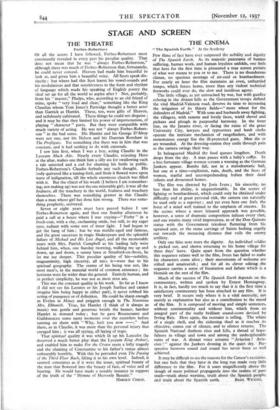THE CINEMA
"The Spanish Earth." At the Acidealy
FEW films of fact have ever surpassed the nobility and dignity Of The Spanish Earth. As its majestic panorama of human suffering, human work, and human loyalties unfolds, one feels that here for the first time is presented a true screen picture of what war means to you or to me. There is no thunderous climax, no specious montage of air-raid or bombardment. For nearly an hour the film maintains an even, unhurried tempo, which forces home, more than any violent technical fireworks could ever do, the slow and insidious agony.
The little village, as yet untouched by war, but with gunfire echoing in the distant hills as the GOvernment troops defend the vital Madrid-Valencia road, devotes its time to increasing the irrigation of its thirsty fields—" more wheat for the defenders of Madrid." With sons and husbands away fighting, the villagers, with remote and lovely faces, wield shovel and pickaxe and plough in purposeful harmony. In the front line, on the Jarama river, or facing the ruins of the great University City, lawyers and typesetters and bank clerks operate the intricate mechanism of rangefinders, and with monotonous energy fire the ill-protected guns. Men die or are wounded. At the dressing-station they smile through pain as the camera swings their way.
In beleaguered Madrid the food queues lengthen. Death drops from the sky. A man passes with a baby's coffin. In a less fortunate village women scream a warning as the German Junkers appear. Bombs fall, not in a melodramatic hail, but one at a time—explosion, ruin, death, and the faces of women, tearful and uncomprehending before their dead infants and devastated homes.
The film was directed by Joris Ivens ; his sincerity, no less than his ability, is unquestionable. In the scenes of fighting or bombardment, which could only be obtained under difficulty and at great personal risk, the camera can naturally be used only as a reporter ; and yet even here one feels the force of a mind well trained to the emphasis of cinema. In the scenes where a more leisured approach was possible, however, a sense of dramatic composition infuses every shot; and one retains many vivid impressions, as of the Don Quixote statue with the Government tricolour fluttering from his upraised arm, or the stone carvings of Saints looking angrily out towards the menacing distance that veils the enemy artillery.
Only one false note mars the dignity. An individual soldier is picked out, and shown returning to his home village for three days' leave. Quite apart from the question whether this sequence relates well to the film, Ivens has failed to make his characters come alive ; their movements of welcome arc stilted and amateurish ; and for all its clever editing the sequence carries a sense of frustration and failure which is a blemish on the rest of the film.
Much of the success of The Spanish Earth depends on the commentary, written and spoken by Ernest Hemingway. It is, in fact, hardly too much to say that it is the first time a satisfactory commentary has been attached to any film. It is very brief. It occurs only where it is a vital necessity, not merely as explanation but also as a contribution to the mood of the film. It- is composed of moving and simple sentences, without sentimentality and without bias, which form an integral part of the really- brilliant sound-score devised by Irving Reis. Here again, the restraint is telling. The whine of a single shell, and the sickening thud as it reaches its objective, comes out of silence, and to silence returns. The Spanish National Anthem rises and falls, a thread of hope- fulness in village and town and among the undecipherable ruins of war. A distant voice screams " Aviation ! Avia- tion ! " against the Junkers droning in the quiet sky. Per- spective between sound and sound has never been so well achieved.
- - - It may be difficult to see the reasons for the Censor's excisions, but one feels that they have- in the long "run made very little difference to the film. For it soars magnificently above the slough of- mere' political propaganda into the- realms of pure truth—truth about wartime, truth about the Spanish people, and truth about the Spanish earth. BASIL WRIGHT.














































 Previous page
Previous page